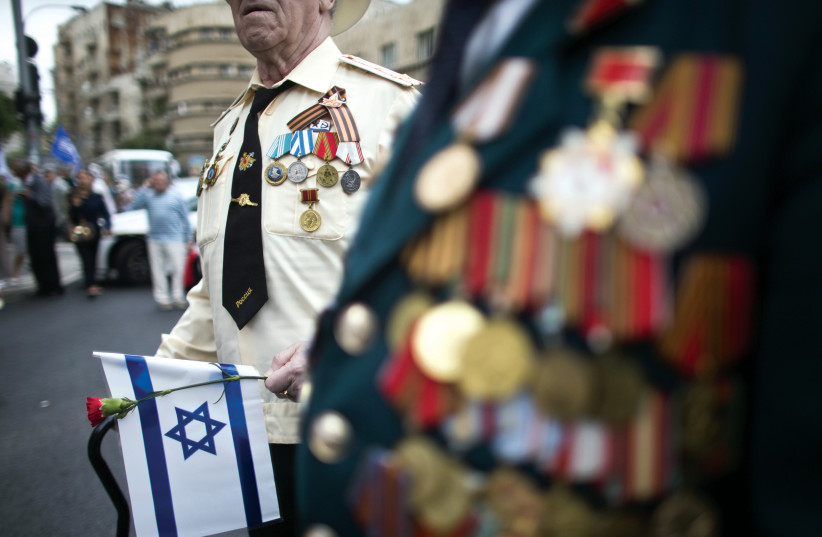The series joins a spate of recent limited series about the Holocaust and World War II, including “The Tattooist of Auschwitz,” which will air on Peacock in May; “Transatlantic,” last year’s Netflix series about Holocaust rescuer Varian Fry; “A Small Light,” the Disney+ miniseries about Anne Frank’s protector, Miep Gies, and the recent Netflix adaptation of Anthony Doerr’s novel, “All the Light We Cannot See.”
“We Were the Lucky Ones” is distinguished from these and other Holocaust dramas by its wide lens. It begins at the Kurc family’s Passover dinner in Radom in 1938. Their life looks as comfortable as their elegant home, despite whispers of antisemitism and Hitler’s ambitions outside their borders.
Parents Sol (Lior Ashkenazi) and Nechuma (Robin Weigert), who run a fabric store, are delighted to welcome home their son Addy, a musician and electrical engineer visiting from Paris. Their other sons Genek (Henry-Lloyd Hughes) and Jakob (Amit Rahav) are budding lawyers, their daughter Mila (Hadas Yaron) is pregnant with her first child and their daughter Halina dreams of following Addy abroad.
This cozy existence is shattered by the outbreak of World War II. Over the course of eight episodes, the family is scattered across the globe: Sol and Nechuma are forced into factory work before they go into hiding in the Polish countryside; Addy flees France for Brazil via detainment in Vichy French-controlled Dakar; Genek and his wife Herta (Moran Rosenblatt) are sent to a Soviet labor camp in Siberia until he is able to join the Polish army, which takes them to Palestine under the British mandate and Italy; Mila hides her daughter in a Warsaw convent; Halina clings to a false identity through torture at the Nazi Montelupich Prison in Krakow.

The vast scope of the family’s migration and the creeping pace of their persecution in “We Were the Lucky Ones” tells a story about the Holocaust beyond the death camps, said Lipez. Family members face exile, robbery, humiliation, forced labor and street massacres before a whisper that Jews are being gassed is heard several episodes in.
“There’s been some good education and storytelling about the death camps that is really necessary,” Lipez told JTA. “But I think this show was an opportunity to focus a lot on those years leading up to the Final Solution, and to show through the really intimate lens of this family the boiling hot water that they were in — in their own society and their own community.”
According to Hunter, her grandfather did not explicitly keep his past a secret from his family. He renamed himself Eddy Courts from Addy Kurc upon arriving in the United States after the war, and intended to start a new chapter and protect his children from a troubled past. When he visited other surviving family members, he sometimes left out the context.
“He would talk about going to Brazil, but he would maybe say that he was going for his birthday — and then my mom would learn later that he planned to be there over Passover,” Hunter recalled.
Luck theme of family story
Luck is the theme of her family’s story: the luck to survive and reunite, but also the chance to create new lives and families far away from the past. The main characters in “We Were the Lucky Ones” are also granted a fortunate moral arc — by the end, their hardships have made the family universally more resilient, generous and loving, a development that not every survivor of trauma is lucky enough to experience.
Of course, there is also an irony to the term “lucky ones,” as each family member endures profound tragedy. King said it is the perception of being lucky despite their circumstances that made the Kurc family compelling to her.
“The perspective that they took was so humbling — to hear them call themselves lucky, it’s just beyond imagination,” said King. “But they survived and they had love in their lives, and they considered themselves lucky.”
While it was Addy Kurc’s luck to leave the Holocaust behind, Hunter sees it as her luck to remember it. Her research took her to interviews with family members on the east and west coasts of the US and in France, Italy and Brazil. At a screening of “We Were the Lucky Ones” in Washington, DC on Wednesday, she will be joined by 25 relatives who flew in from across the world.
Even though she was not raised with Jewish identity, Hunter said that this project has brought her closer to herself, an identity rooted in her Jewish family history.
“I feel like my eyes have been opened to these pieces of me that were always there, but that are so apparent now — whether it’s the stubborn gene, not ever taking no for an answer, or having the courage to set out and try to complete this project over the course of nine years,” said Hunter. “I see so much of myself in my grandfather and my relatives.”